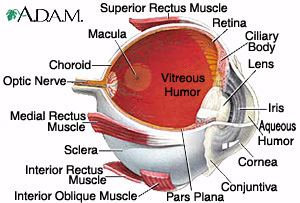|
Episcleritis
Episcleritis
Episcleritis is an inflammatory ( diffuse redness) condition of the connective tissue between the Conjuntiva and Sclera in one or both eyes. It is usually a mild, self-limiting, recurrent disease. 70% are idiopathic and about 30% of cases are associated with an underlying disorder. One warning: doctors, including ophthalmologists, can misname a patient's Eye inflammation, calling it Episcleritis when it is Scleritis. It matters tremendously, since true Scleritis, as opposed to Episcleritis, is associated with an underlying disorder about 70% of the time, and Scleritis can produce serious damage to the Eye; Episcleritis never does.
2 clinical types of Epicslceritis are Simple and Nodular.
Simple Episcleritis, the most common, there are intermittent bouts, moderate-to-severe inflammation that often recur at 1- to 3-month intervals. The episodes usually last 7-10 days, and most resolve after 2-3 weeks. Prolonged episodes may be more common in patients with associated systemic conditions. Some patients note that episodes are more common in the spring or fall.
Nodular Episcleritis (translucent white nodule centrally within the inflamed area ) have prolonged attacks of inflammation that are typically more painful than simple Episcleritis. Many patients with Nodular Episcleritis have an associated systemic disease.

Symptoms
Redness of the eyes, mild pain, tenderness, discomfort, sensitivity to light, tearing.
Cause
Episcleritis usually has no apparent cause; however, it is sometimes associated with systemic disease such as Rheumatoid Arthritis, Polyarteritis Nodosa, Systemic Lupus Erythematosus, Sjogren's Syndrome, Sarcoidosis, Wegener's Granulomatosis, Gout, and inflammatory Bowel Disease, Rosacea, herpes simplex, Tuberculosis, and other diseases.
Treatment
Treatment for Episcleritis is usually not needed. Artificial tears can be used to soothe the eye and reduce mild inflammation. In more severe cases of Episcleritis, mild steroids and anti-inflammatory medications are prescribed.
Complications
Relapses may occur,
rarely, Scleritis may develop. There may be associated Uveitis.
Links to References,
Ocular, and Immunologicial-Vasculitis Help
St Lukes Eye
EMedicine
Merck
HEALTHCENTRAL
Handbook of Ocular Disease
EyeMDLink
MEDLINEplus
Cleveland Clinic Immunologic Disease Center
Cole Eye Institute
John Hopkins Vaculitis Center
John Hopkins
Wilmer Eye Institute
National Eye Institute
Disclaimer: I'm not a doctor nor do I play one on TV!!!
 Copyright © 2002-2006 LMK
Copyright © 2002-2006 LMK
|